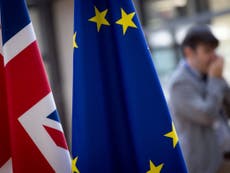The government needs to be honest with the public about the consequences of Brexit
The EU-UK withdrawal agreement does not threaten national security, it merely threatens Conservative politicians with embarrassment – these are not the same thing

The pieces are falling into place. The prospects for a Final Say referendum have never been better, and the case is growing ever more compelling. Yesterday came two more developments that are helpful to the cause of democratic control and the right of British people to approve the final terms of Brexit now they have been agreed between the government and the European Union.
First, the government has been shamed in the House of Commons about its refusal to release the full, final legal advice by the attorney general on the withdrawal agreement. Ministers cite the ministerial code, freedom of information laws, Erskine May (parliamentary practice) and national security – but refuse, ironically, to accept that the will of parliament is in fact final and sovereign in this as in all other matters. So much, it might be said, for “taking back control”. The EU-UK withdrawal agreement does not threaten national security, it merely threatens Conservative politicians with embarrassment – these are not the same thing.
Precedent works both ways. When Britain engaged in an illegal and disastrous invasion of Iraq in 2003, political and constitutional lessons were drawn, and one of those was that in a matter of fundamental importance the attorney general’s advice must be submitted to MPs so they can make an informed decision about the future of the country. It should not be suppressed.
The same, in the context of a people’s vote on the Brexit terms, applies to the electorate. Opposition MPs, and some conscientious Conservatives on all sides of this debate, are suspicious about what the government is up to because there have been so many broken promises and U-turns during the Brexit process. They are right to be wary about ministerial assurances; they are right, as a simple matter of principle, to insist on the power of the Commons to prevail over the historical Crown privilege (a principle of law preventing disclosure of evidence deemed to be damaging to the public interest).
Second, the legal advice emanating from Europe suggests that the British government, like any EU member state, can indeed unilaterally withdraw an Article 50 application to leave the EU if it so wishes. There would be, in other words, no veto to be applied by any awkward fellow member looking to gain some political advantage from a member state that has changed its mind.
Thus there is no legal impediment, it would appear, to Britain giving notice to the European Union that it wishes to reverse or “pause” the Article 50 proceedings. In reality, such is the weight of opinion in the EU in favour of retaining the UK as a member of the club, it was always unlikely that the application to set aside an Article 50 procedure would be opposed. The EU realises the UK leaving the union is neither in the British interest nor in the European interest, though it will be far more damaging to Britain than to any other member state.
If anything, the mess that Brexit was always going to be – it was inevitably going to be economically painful for Britain – has left the Leave cause with few arguments in its favour. For the prime minister is quite right in arguing that the only practical Brexit proposal is the one that she had managed to extract from Michel Barnier and his colleagues. Given the UK’s “red lines”, no other deal is possible, with the exception of no-deal Brexit, which enjoys little support in parliament and not much in the country. That Brexit is in such jeopardy as it is today is not down to some establishment plot or ministerial treachery or incompetence, but rather to the brutal economic realities behind diplomacy – that the EU is 10 times larger, roughly, than the UK, and has the bargaining power to match. A Brexiteering dream team of Winston Churchill, William Shakespeare, Henry V and Margaret Thatcher could not have extracted better terms, in any substance, than Theresa May and her travelling circus managed to.
So, to borrow a phrase, Brexit means... the Brexit withdrawal agreement, plus the woolly political declaration attached to it. It is not an attractive option, to virtually anyone, and nor are any of the others. No deal is not an option many would stomach. “Canada Plus”, “Norway” and all its variants cannot be agreed by the EU because of the UK’s own “red lines” – the Irish border, migration, the European Court of Justice. A general election is not going to be voted for by Tory MPs, who have also gone off the idea of replacing Ms May. Nor are the Tory benches going to meekly allow Jeremy Corbyn to form a minority Labour administration without a general election. Besides, a general election could not solve Brexit, even assuming a change of government (far from certain).
Mr Corbyn, Keir Starmer and Barry Gardiner can go to Brussels, enjoy a lavish lunch from Mr Barnier and Jean-Claude Juncker, and be politely informed that Ms May’s deal is, in fact, as good as it gets. The election would solve nothing, not least because Labour’s policy is as threadbare as the government’s.
And so it remains the case that the only way to resolve the issue is to hand the mewling infant Brexit back to its absentee parents – the British voters who begot it. It is gaining a powerful momentum. A Final Say will be had, and probably in the spring. Given the chaos in parliament, it is time for the people to take back control.





Join our commenting forum
Join thought-provoking conversations, follow other Independent readers and see their replies